Search results
Author(s):
Hans-Willi Breuer
Added:
3 years ago
Epidemiology has repeatedly shown that elevated levels of cholesterol play a key role in the development of atherosclerotic disease. In particular, low density lipoprotein (LDL) cholesterol has been strongly associated with coronary heart disease (CHD) risk.1-5 Lowering LDL cholesterol reduces the incidence of atherosclerotic disease, irrespective of how the reduction is achieved. The efficacy of…
View more
Author(s):
Hans-Willi Breuer
Added:
3 years ago
Abstract
Studies have consistently shown that coronary heart disease (CHD) risk is correlated closely with low density lipoprotein (LDL) cholesterol levels. The lower the LDL cholesterol, the lower the cardiovascular (CV) risk; however, there is a question over how much LDL cholesterol lowering is low enough and what supporting evidence there is for this. This article reviews recent evidence in…
View more
Author(s):
Gordon Lowe
,
John Yarnell
Added:
3 years ago
Clinicians and pathologists have long recognised the role of the haemostatic system in acute coronary and cerebral thrombosis, and anti-platelet, anticoagulant and fibrinolytic therapies are well established in clinical practice. Pathologists have suggested for several decades that 'hypercoagulability' contributes to the development of atheroma,1 plaque formation and rupture.2,3 Pioneering…
View more
Author(s):
Benedikt Schrage
Added:
2 years ago
In this short video, Dr Benedikt Schrage (University Heart and Vascular Center Hamburg, DE) summarises the main findings from the analysis that looked into the association between AID/FID with incident CV disease and mortality in 2 164 individuals from three European population-based cohorts. The study, published in the ESC Heart Failure (2021), found that attributable risks ofFID for the tested…
View more
Lorenz Räber
Author
Maarten J Cramer
Author
Author(s):
J Christoph Geller
Added:
3 years ago
Cardiovascular disease is the leading cause of death worldwide. Elevated low-density lipoprotein (LDL) cholesterol levels, hypertension, diabetes and smoking are key modifiable risk factors.1,2 Published practice guidelines3–10 recommend aggressive treatment of individual risk factors and have defined thresholds for the initiation of and goals for treatment (see Table 1). These treatment…
View more
Targeting Two Sources of Cholesterol - An Advanced Treatment Approach to Lipid-lowering Management
Author(s):
Alberico L Catapano
Added:
3 years ago
Article
Author(s):
Hugo Saner
Added:
3 years ago
Coronary heart disease (CHD) is the leading cause of death in most countries. It is also a major cause of physical disability, particularly in the rapidly growing population of elderly people. The prevention of subsequent coronary events and the maintenance of physical functioning in such patients are major challenges in preventative care.
Cardiac rehabilitation (CR) programmes were first…
View more
Author(s):
Hugo Saner
Added:
3 years ago
Coronary heart disease (CHD) is the leading cause of death in most countries. It is also a major cause of physical disability, particularly in the rapidly growing population of elderly people. The prevention of subsequent coronary events and the maintenance of physical functioning in such patients are major challenges in preventative care.
Cardiac rehabilitation (CR) programmes were first…
View more













